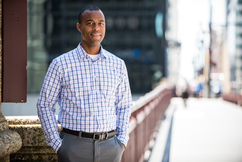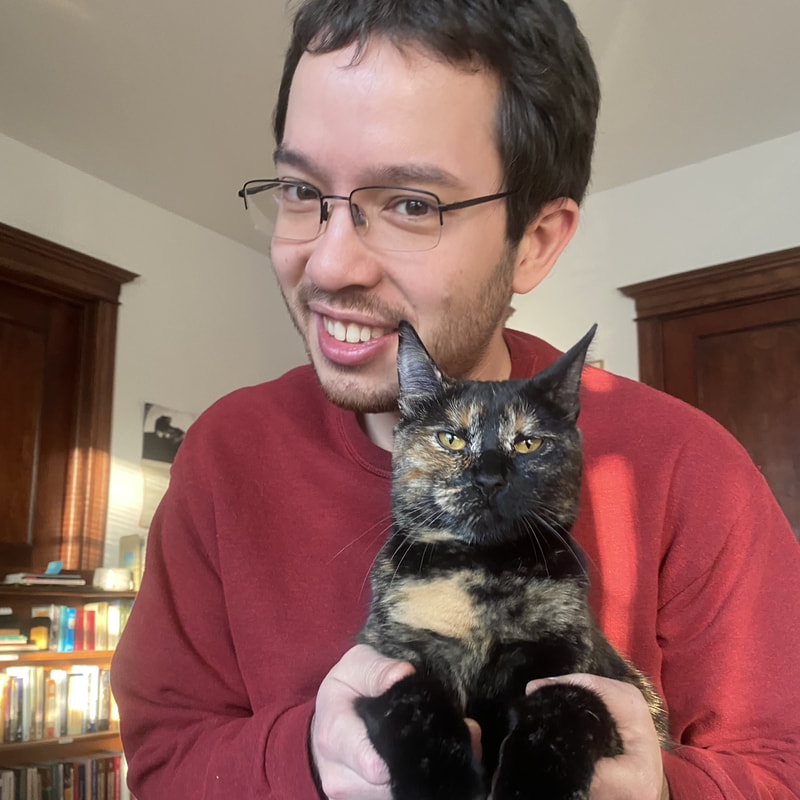 Photo by Max Herman. Published in the TCR Talks series of the Chicago Reporter. Philip Nevels stands on Chicago's Jackson Boulevard Bridge downtown. The structure symbolizes the work he does with High Jump, an academic enrichment program designed to help build bridges of opportunity for local youth. Philip Nevels grew up near the Pullman neighborhood on Chicago’s South Side. Thanks to his single mother and a unique academic enrichment program called High Jump, he attended a military boarding school, graduated from Princeton University, started a business, met his wife and started a family back here in Chicago. And just this summer, Nevels assumed the role of vice chairman of High Jump’s Board of Trustees, giving back to the program that has given so much to him. He mentors new High Jump students—High Jumpers, as they are called—and helps his fellow alumni support each other professionally and personally. “My life is basically my wife and three daughters, my professional career, and High Jump. And that's pretty much all I do,” Nevels says. “I encounter a lot of people who have achieved phenomenal success. And a lot of them forget how hard it was to get there, forget how many people it took to get them there. I haven't forgotten. And inasmuch as I can make progress easier for someone else who's 13 or 14 years old, I would like to.” The Reporter recently met with Nevels to talk about his life and the impact of High Jump. What is High Jump, and how did you join the program?
High Jump aims to get middle-school students whose families have limited means into the best high schools. A lot of programs intervene later in high school, at that transition to college. But High Jump intervenes earlier in the teens, at a critical time in children’s lives. Children are forming an awareness of where they can fit in the world. Specifically, High Jump targets middle-schoolers looking for more academic rigor. It does so by supplementing their regular education with programming in both the school year and summer. But also—and this is really how it impacted me—it introduces students to opportunities. …I joined the program because my mom's a Chicago Public Schools teacher. She introduced me to it. What was your background prior to High Jump? I grew up near 116th and King. I lived in a single-parent household. My mom (Sandra Nevels) raised me very well. We actually lived in an apartment building that she owned. My aunt lived in the apartment above us. We all lived in that area, my grandparents, my aunts and uncles, my cousins. We’re a very tight knit family. What was your experience in High Jump? It was phenomenal. First, I met kids like me, who were similarly motivated. So we built amazing relationships. Also, it put me on the right track academically, particularly around math. And of course, it introduced me to opportunities, like boarding school. Jack Kurty, then High Jump’s executive director, literally spoke to me one day, asking me if I had ever considered boarding school. I hadn't; I didn't even know what it was. And he put me and a couple other High Jumpers on a big white van and drove us to Culver, a military high school. I ended up going to Culver, and I put a 100 percent of that on High Jump. He opened a door I didn’t even know existed. And, you know, Culver then opened up a number of doors for me. I met incredible people, got accepted to every college I applied to, and went to Princeton. It’s the “bridging” concept. You don't just jump from here to there, there's a path you have to follow. What was your experience socially? Some stuff I can't share because we were, you know, teenage boys, dirty jokes, whatever. (laughs) But our conversations ranged. Those were probably the first times I had debates about school subjects. And again, you’re figuring out who your friends are going to be, and you're all forming at the same time. I still keep in touch with my lunchtime buddies: Me, Jesus, Ramon, Vincent, I mean, that was the clique! As you age, the relationships that you're making aren't as deep as the ones that you're making as a younger person. So High Jump alumni could actually connect with each other in ways college alumni might not. Of course, High Jump’s alumni network is not where it needs to be. It’s not institutionalized at the moment, but we have a growing alumni base. And that's part of my focus on the board. My lunchtime buddy Vincent is now a lawyer, we were chatting a couple days ago. I consulted him about a legal issue. And that's exactly how alumni are supposed to work: We're helping each other. What was your school experience before and after High Jump? Until second grade I could have gone either way. I wasn't a fantastic student in second grade; I can recall that very vividly. But in third grade, I started to develop competitiveness. That's another plus of High Jump, friendly competition. Right after High Jump, at Culver, I actually took that to a whole other level. Something about being away from home: I felt this need to prove myself. So I graduated second in my class. And Culver’s a military school, so I did everything I could militarily, academically, athletically -- captain of the fencing team for two years. I mean, fencing, who does that? Then, while I was at Princeton, my mom passed away. So that was really, really hard. But I think the things my mom did in my upbringing, and the interventions of organizations like High Jump allowed me to move on. How did you fit in at Culver and Princeton? I was incredibly different. Culver’s in the middle of Indiana: You can imagine. I think the African American population was like, five percent. But actually, most of my friends were from Asia—Thai, Japanese, Indian friends, a really eclectic group. Still, they were all wealthy, and I was not. Their parents were doctors, diplomats, etc. But the neat thing about Culver, as a military school, everything was sort of equalized. So it might be a little different than your average preparatory school where you've got rich kids and poor kids. How does your background shape how you contribute to High Jump? I've always been the minority. There's not a lot of me, particularly males—African American males— wherever I've been, and that's been since grade school. That helps me be a mentor for current High Jumpers, particularly young black boys. Allowing them to see opportunity. To see that they too can be a minority in professional circles. So much of it is just seeing yourself where you want to be. Just as Jack Kurty showed me I could go to boarding school. And through High Jump, you now have a family of your own! Yay! Back in High Jump, I had a huge crush on my wife (Amina). We were 13, I was extremely shy, we weren't really friends. But then, senior year of college, High Jump sent an alumni booklet. I looked her up and emailed her, something like, “I don't know if you remember me, but I had a huge crush on you.” And it went to her junk folder. She was deleting her spam and saw it. She thought it was cute and replied. So we met back in Chicago for Easter. And we've now been married for seven years. In two weeks it'll be seven years. Oh, so our anniversary's coming up, I should figure that out! And like I said, we have three daughters, and that's all due to High Jump. High Jump was successful for me, so my daughters (Zoe, Jada and Sydney) are not a fit for the program. I'm at a different place than a single mom, my mom raising me. Yet that's because of my mom, because of High Jump. I know that if you look at polls, parents don’t think their kids are better off than they were. But for me, I’d say just the opposite. This interview was edited and condensed for clarity. |
Professionally...[my name] at yahoo dot com
|

 RSS Feed
RSS Feed
